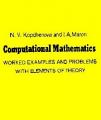
Iterative Methods for Sparse Linear Systems
by Yousef Saad
Publisher: PWS 1996
ISBN/ASIN: 0898715342
Description:
The book gives an in-depth, up-to-date view of practical algorithms for solving large-scale linear systems of equations. These equations can number in the millions and are sparse in the sense that each involves only a small number of unknowns. The methods described are iterative, i.e., they provide sequences of approximations that will converge to the solution.
Download or read it online for free here:
Download link
(multiple formats)
Similar books
 Computational Mathematics for Differential Equations
Computational Mathematics for Differential Equationsby N. V. Kopchenova, I. A. Maron
This is a manual on solving problems in computational mathematics. The book is intended primarily for engineering students, but may also prove useful for economics students, graduate engineers, and postgraduate students in the applied sciences.
(18529 views)
 Lectures on The Finite Element Method
Lectures on The Finite Element Methodby Ph. Ciarlet - Tata Institute of Fundamental Research
Our basic aim has been to present some of the mathematical aspects of the finite element method, as well as some applications of the finite element method for solving problems in Elasticity. This is why some important topics are not covered here.
(10615 views)
 Tea Time Numerical Analysis
Tea Time Numerical Analysisby Leon Q. Brin - Southern Connecticut State University
A one semester introduction to numerical analysis. Includes typical introductory material, root finding, numerical calculus, and interpolation techniques. The focus is on the mathematics rather than application to engineering or sciences.
(9440 views)
 Mathematical Computation
Mathematical Computationby Ian Craw - University of Aberdeen
The overall aim of the course is to present modern computer programming techniques in the context of mathematical computation and numerical analysis and to foster the independence needed to use these techniques as appropriate in subsequent work.
(14718 views)